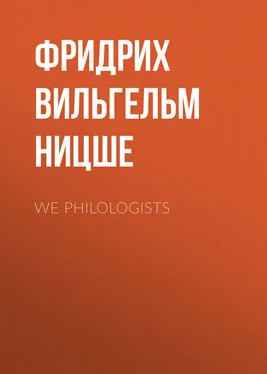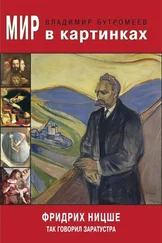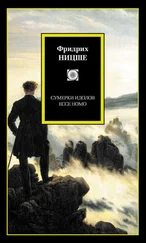Фридрих Ницше - We Philologists
Здесь есть возможность читать онлайн «Фридрих Ницше - We Philologists» — ознакомительный отрывок электронной книги совершенно бесплатно, а после прочтения отрывка купить полную версию. В некоторых случаях можно слушать аудио, скачать через торрент в формате fb2 и присутствует краткое содержание. Жанр: Философия, literature_19, foreign_antique, foreign_prose, на английском языке. Описание произведения, (предисловие) а так же отзывы посетителей доступны на портале библиотеки ЛибКат.
- Название:We Philologists
- Автор:
- Жанр:
- Год:неизвестен
- ISBN:нет данных
- Рейтинг книги:3 / 5. Голосов: 1
-
Избранное:Добавить в избранное
- Отзывы:
-
Ваша оценка:
- 60
- 1
- 2
- 3
- 4
- 5
We Philologists: краткое содержание, описание и аннотация
Предлагаем к чтению аннотацию, описание, краткое содержание или предисловие (зависит от того, что написал сам автор книги «We Philologists»). Если вы не нашли необходимую информацию о книге — напишите в комментариях, мы постараемся отыскать её.
We Philologists — читать онлайн ознакомительный отрывок
Ниже представлен текст книги, разбитый по страницам. Система сохранения места последней прочитанной страницы, позволяет с удобством читать онлайн бесплатно книгу «We Philologists», без необходимости каждый раз заново искать на чём Вы остановились. Поставьте закладку, и сможете в любой момент перейти на страницу, на которой закончили чтение.
Интервал:
Закладка:
Friedrich Wilhelm Nietzsche
We Philologists / Complete Works of Friedrich Nietzsche, Volume 8
TRANSLATOR'S INTRODUCTION
The subject of education was one to which Nietzsche, especially during his residence in Basel, paid considerable attention, and his insight into it was very much deeper than that of, say, Herbert Spencer or even Johann Friedrich Herbart, the latter of whom has in late years exercised considerable influence in scholastic circles. Nietzsche clearly saw that the "philologists" (using the word chiefly in reference to the teachers of the classics in German colleges and universities) were absolutely unfitted for their high task, since they were one and all incapable of entering into the spirit of antiquity. Although at the first reading, therefore, this book may seem to be rather fragmentary, there are two main lines of thought running through it: an incisive criticism of German professors, and a number of constructive ideas as to what classical culture really should be.
These scattered aphorisms, indeed, are significant as showing how far Nietzsche had travelled along the road over which humanity had been travelling from remote ages, and how greatly he was imbued with the pagan spirit which he recognised in Goethe and valued in Burckhardt. Even at this early period of his life Nietzsche was convinced that Christianity was the real danger to culture; and not merely modern Christianity, but also the Alexandrian culture, the last gasp of Greek antiquity, which had helped to bring Christianity about. When, in the later aphorisms of "We Philologists," Nietzsche appears to be throwing over the Greeks, it should be remembered that he does not refer to the Greeks of the era of Homer or Æschylus, or even of Aristotle, but to the much later Greeks of the era of Longinus.
Classical antiquity, however, was conveyed to the public through university professors and their intellectual offspring, and these professors, influenced (quite unconsciously, of course) by religious and "liberal" principles, presented to their scholars a kind of emasculated antiquity. It was only on these conditions that the State allowed the pagan teaching to be propagated in the schools; and if, where classical scholars were concerned, it was more tolerant than the Church had been, it must be borne in mind that the Church had already done all the rough work of emasculating its enemies, and had handed down to the State a body of very innocuous and harmless investigators. A totally erroneous conception of what constituted classical culture was thus brought about. Where any distinction was actually made, for example, later Greek thought was enormously over-rated, and early Greek thought equally undervalued. Aphorism 44, together with the first half-dozen or so in the book, may be taken as typical specimens of Nietzsche's protest against this state of things.
It must be added, unfortunately, that Nietzsche's observations in this book apply as much to England as to Germany. Classical teachers here may not be rated so high as they are in Germany, but their influence would appear to be equally powerful, and their theories of education and of classical antiquity equally chaotic. In England as in Germany they are "theologians in disguise." The danger of modern "values" to true culture may be readily gathered from a perusal of aphorisms that follow: and, if these aphorisms enable even one scholar in a hundred to enter more thoroughly into the spirit of a great past they will not have been penned in vain.
J. M. KENNEDY.London, July 1911 .
1
To what a great extent men are ruled by pure hazard, and how little reason itself enters into the question, is sufficiently shown by observing how few people have any real capacity for their professions and callings, and how many square pegs there are in round holes: happy and well chosen instances are quite exceptional, like happy marriages, and even these latter are not brought about by reason. A man chooses his calling before he is fitted to exercise his faculty of choice. He does not know the number of different callings and professions that exist; he does not know himself; and then he wastes his years of activity in this calling, applies all his mind to it, and becomes experienced and practical. When, afterwards, his understanding has become fully developed, it is generally too late to start something new; for wisdom on earth has almost always had something of the weakness of old age and lack of vigour about it.
For the most part the task is to make good, and to set to rights as well as possible, that which was bungled in the beginning. Many will come to recognise that the latter part of their life shows a purpose or design which has sprung from a primary discord: it is hard to live through it. Towards the end of his life, however, the average man has become accustomed to it – then he may make a mistake in regard to the life he has lived, and praise his own stupidity: bene navigavi cum naufragium feci . he may even compose a song of thanksgiving to "Providence."
2
On inquiring into the origin of the philologist I find:
1. A young man cannot have the slightest conception of what the Greeks and Romans were.
2. He does not know whether he is fitted to investigate into them;
3. And, in particular, he does not know to what extent, in view of the knowledge he may actually possess, he is fitted to be a teacher. What then enables him to decide is not the knowledge of himself or his science; but
( a ) Imitation.
( b ) The convenience of carrying on the kind of work which he had begun at school.
( c ) His intention of earning a living.
In short, ninety-nine philologists out of a hundred should not be philologists at all.
3
The more strict religions require that men shall look upon their activity simply as one means of carrying out a metaphysical scheme: an unfortunate choice of calling may then be explained as a test of the individual. Religions keep their eyes fixed only upon the salvation of the individual. whether he is a slave or a free man, a merchant or a scholar, his aim in life has nothing to do with his calling, so that a wrong choice is not such a very great piece of unhappiness. Let this serve as a crumb of comfort for philologists in general; but true philologists stand in need of a better understanding: what will result from a science which is "gone in for" by ninety-nine such people? The thoroughly unfitted majority draw up the rules of the science in accordance with their own capacities and inclinations; and in this way they tyrannise over the hundredth, the only capable one among them. If they have the training of others in their hands they will train them consciously or unconsciously after their own image. what then becomes of the classicism of the Greeks and Romans?
The points to be proved are —
( a ) The disparity between philologists and the ancients.
( b ) The inability of the philologist to train his pupils, even with the help of the ancients.
( c ) The falsifying of the science by the (incapacity of the) majority, the wrong requirements held in view; the renunciation of the real aim of this science.
4
All this affects the sources of our present philology: a sceptical and melancholy attitude. But how otherwise are philologists to be produced?
The imitation of antiquity: is not this a principle which has been refuted by this time?
The flight from actuality to the ancients: does not this tend to falsify our conception of antiquity?
5
We are still behindhand in one type of contemplation: to understand how the greatest productions of the intellect have a dreadful and evil background. the sceptical type of contemplation. Greek antiquity is now investigated as the most beautiful example of life.
Читать дальшеИнтервал:
Закладка:
Похожие книги на «We Philologists»
Представляем Вашему вниманию похожие книги на «We Philologists» списком для выбора. Мы отобрали схожую по названию и смыслу литературу в надежде предоставить читателям больше вариантов отыскать новые, интересные, ещё непрочитанные произведения.
Обсуждение, отзывы о книге «We Philologists» и просто собственные мнения читателей. Оставьте ваши комментарии, напишите, что Вы думаете о произведении, его смысле или главных героях. Укажите что конкретно понравилось, а что нет, и почему Вы так считаете.


![Фридрих Ницше - Песни Заратустры [сборник]](/books/28216/fridrih-nicshe-pesni-zaratustry-sbornik-thumb.webp)






